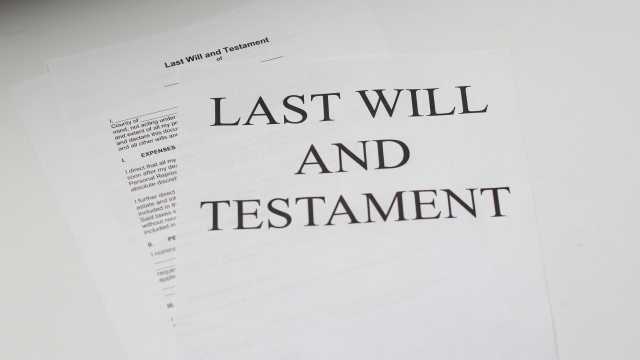Estate Planning
An irrevocable trust is a powerful component of estate planning, designed to offer asset protection, tax advantages, and precise control over the distribution of one's wealth. Once set up, it cannot be modified or rescinded by the grantor, setting it apart from other estate planning tools.

R. Tyler End, CFP®
•
Published March 22nd, 2024
•
Updated April 1st, 2024
Table of Contents
Key Takeaways
An irrevocable trust means you can’t change or access the assets in it once you’ve finalized everything.
Irrevocable trusts can protect your assets from creditors and taxation while you’re still alive.
There are different types of irrevocable trusts, each with its own benefits.
An irrevocable trust is a powerful component of estate planning, designed to offer asset protection, tax advantages, and precise control over the distribution of one's wealth. Once set up, the grantor cannot modify or rescind it, setting it apart from other estate planning tools. This unchangeable nature provides significant benefits, such as reducing estate taxes and ensuring long-term financial security for beneficiaries. This brief overview introduces irrevocable trust, highlighting its key features and its strategic role in safeguarding an individual's financial legacy.
What is an Irrevocable Trust?
An irrevocable trust is a legal arrangement and a cornerstone of advanced estate planning through which assets are placed under the management of a trustee for the benefit of the trust's beneficiaries. Distinguished by its immutable nature once established, the trust's terms cannot be modified, amended, or terminated without the consent of its beneficiaries. This aspect differentiates it from a revocable trust, which allows the grantor—the individual who creates the trust—the flexibility to make changes during their lifetime.
Key Characteristics
- Permanent: Once the grantor transfers assets into an irrevocable trust, they relinquish control over those assets, effectively removing them from the grantor's estate.
- Asset Protection: By transferring ownership of assets to the trust, they are shielded from creditors and legal judgments against the grantor.
- Tax Advantages: Irrevocable trusts can provide significant tax benefits, including reduced estate taxes, since the assets are no longer considered part of the grantor's taxable estate.
Purpose and Benefits
- Estate Tax Reduction: Particularly beneficial for individuals with large estates, placing assets in an irrevocable trust can help minimize the estate tax burden upon the grantor's death.
- Asset Management and Distribution: Trusts allow for detailed stipulations on how and when assets are distributed to beneficiaries, which can support minors, individuals with special needs, or any situation requiring long-term financial management.
- Privacy: Unlike wills, which become public records during the probate process, an irrevocable trust offers privacy regarding the distribution of assets.
Revocable vs Irrevocable
When planning your estate, choosing between a revocable and an irrevocable trust is a pivotal decision. Both serve the purpose of managing and protecting your assets for the benefit of your beneficiaries, but they do so in fundamentally different ways, each with its own set of advantages and considerations.
Revocable Trusts
- Flexibility: A revocable trust, often called a living trust, allows the grantor (the person who creates the trust) to retain control over the assets. The grantor can modify, amend, or revoke the trust at any time during their lifetime.
- Probate Avoidance: Assets placed in a revocable trust bypass the probate process, facilitating a smoother and private transfer of assets to beneficiaries upon the grantor's death.
- Limited Asset Protection: Since the grantor maintains control over the assets, they are considered part of the grantor’s estate for creditor claims and estate taxes.
Irrevocable Trusts
- Permanent: Once established, the grantor cannot alter or revoke an irrevocable trust, cementing the trust terms and asset distribution plans as laid out at its creation.
- Asset Protection and Tax Benefits: Assets transferred to an irrevocable trust are removed from the grantor's estate, offering protection from creditors and potential tax advantages, including reduced estate taxes.
- Loss of Control: The grantor relinquishes control over assets placed into an irrevocable trust, transferring ownership to the trust itself.
- Key Differences and Considerations
- Control and Flexibility: The primary difference lies in the control and flexibility the grantor retains. With a revocable trust, you keep control over your assets and can adjust the trust as your situation changes. An irrevocable trust, however, requires you to give up control, which can be a significant consideration for many.
- Estate Tax Implications: For individuals with larger estates, the irrevocable trust offers clear advantages in terms of estate tax reduction, something not directly achievable with a revocable trust.
- Estate Planning Goals: Your choice depends on your primary objectives—whether asset protection and tax savings (irrevocable) outweigh the need for flexibility and control (revocable).
How Does an Irrevocable Trust Work?
An irrevocable trust operates as a fixed legal entity into which a grantor transfers ownership of assets, relinquishing control in favor of the trust’s beneficiaries under the stewardship of a trustee. Once established, its terms cannot be modified or revoked without the beneficiaries' consent, making it a powerful tool for estate planning, asset protection, and tax strategy. Understanding the mechanics of how an irrevocable trust functions can provide clarity on its role in managing and protecting assets.
Establishment and Funding
- Creation: The process begins with the drafting of a trust document, outlining the trust’s terms, including beneficiary designations, the trustee’s powers, and how the trust assets should be managed and distributed.
- Funding: The grantor transfers assets into the trust, effectively removing ownership from their personal estate. This can include cash, stocks, real estate, or other valuable assets.
Trustee Management
- Role of the Trustee: A trustee, appointed by the grantor, assumes responsibility for managing the trust’s assets according to the trust's terms and for the benefit of the beneficiaries. This includes making investment decisions, paying bills, and distributing assets.
- Fiduciary Duty: Trustees are bound by a fiduciary duty to act in the best interests of the beneficiaries, ensuring the trust's purpose is fulfilled ethically and effectively.
Types of Irrevocable Trusts
That said, there are several types of irrevocable trusts to look into when you die. These include:
Bypass Trusts (Credit Shelter Trusts)
- Purpose: Designed to help married couples minimize estate taxes by utilizing each spouse's estate tax exemption.
- How It Works: Upon the death of the first spouse, assets up to the estate tax exemption limit are placed into the trust, benefiting the surviving spouse without being subject to estate taxes upon their death.
Charitable Trusts
- Types: Charitable Remainder Trusts (CRTs) and Charitable Lead Trusts (CLTs).
- Purpose: To provide a charitable organization with financial support while also offering tax benefits to the grantor.
- How It Works: CRTs provide an income stream to non-charitable beneficiaries for a period, with the remainder going to charity. CLTs do the opposite, providing income to a charity for a term, with the remainder going to non-charitable beneficiaries.
Life Insurance Trusts (ILITs)
- Purpose: To exclude life insurance proceeds from the grantor's taxable estate, reducing estate taxes.
- How It Works: The trust owns a life insurance policy on the grantor's life, pays the premiums, and distributes the death benefit to the beneficiaries, outside of the taxable estate.
Special Needs Trusts
- Purpose: To provide for a beneficiary with special needs without disqualifying them from receiving government benefits.
- How It Works: The trust holds assets for the benefit of the individual with special needs, used to supplement government benefits without replacing them.
Spendthrift Trusts
- Purpose: To protect beneficiaries from their inability to manage money or from creditors.
- How It Works: The trust restricts the beneficiary’s direct access to the trust assets, with distributions made according to the trustee's discretion or a specific schedule.
Generation-Skipping Trusts (GSTs)
- Purpose: To pass assets directly to grandchildren or later generations, bypassing the children’s generation to save on estate taxes.
- How It Works: The trust is set up to benefit the grantor's grandchildren, with the assets not considered part of the children’s estate, thereby reducing the overall estate tax impact.
Qualified Personal Residence Trusts (QPRTs)
- Purpose: To reduce the size of the taxable estate by transferring a personal residence into a trust at a reduced gift tax value.
- How It Works: The grantor retains the right to live in the home for a term of years, after which the property passes to the beneficiaries, often at a significantly reduced tax cost.
Grantor Retained Annuity Trusts (GRATs)
- Purpose: To transfer asset growth out of the grantor’s estate at minimal gift tax cost.
- How It Works: The grantor places assets into the trust, receiving an annuity for a term, with any remaining assets passing to the beneficiaries tax-free or at a reduced tax rate.
Tax Benefits & Irrevocable Trusts
Irrevocable trusts are highly regarded in estate planning for their substantial tax benefits, which can significantly impact the financial legacy left to beneficiaries. By effectively removing assets from the grantor's estate, these trusts can minimize exposure to estate taxes, offering a strategic advantage for preserving wealth across generations. When assets are transferred into an irrevocable trust, they are no longer considered part of the grantor's taxable estate. This means that the growth of these assets and their ultimate distribution to beneficiaries can often occur outside the purview of estate taxes, thereby reducing the overall tax liability upon the grantor's death.
Moreover, irrevocable trusts can offer income tax advantages under certain conditions. For example, some trusts are designed to generate charitable deductions or to shift income to beneficiaries who may be in a lower tax bracket, effectively reducing the overall tax burden associated with investment income. Trusts like Charitable Lead Trusts (CLTs) and Charitable Remainder Trusts (CRTs) not only support philanthropic goals but also provide the grantor with valuable tax deductions. Additionally, by allocating income to beneficiaries, the trust's investment income may be taxed at a lower rate, further optimizing the financial efficiency of the trust's assets. These tax strategies underscore the importance of careful planning and consultation with estate and tax professionals to ensure that an irrevocable trust is structured to achieve optimal tax benefits while fulfilling the grantor's estate planning objectives.
Frequently asked questions
What defines an irrevocable trust?
An irrevocable trust is a legal arrangement where the grantor transfers assets into the trust, relinquishing control and ownership. Once established, the trust terms cannot be changed or revoked without the beneficiaries' consent. This type of trust is managed by a trustee for the benefit of the named beneficiaries.
Why would someone set up an irrevocable trust?
Individuals often set up irrevocable trusts for asset protection, estate tax reduction, and to ensure specific conditions are met for asset distribution. These trusts can protect assets from creditors, provide for loved ones with special needs, or manage charitable giving, among other objectives.
Can an irrevocable trust be changed or revoked?
Generally, no. Once established, an irrevocable trust’s terms are permanent. However, under certain circumstances and with the consent of all beneficiaries, modifications might be possible through legal proceedings or built-in trust provisions.
What are the tax benefits of an irrevocable trust?
Assets placed into an irrevocable trust are removed from the grantor's taxable estate, potentially reducing estate taxes upon death. Additionally, the trust may be structured to provide income tax benefits, either by accruing income within the trust or distributing it to beneficiaries in lower tax brackets.
How does an irrevocable trust differ from a revocable trust?
The key difference is flexibility; a revocable trust allows the grantor to retain control over the assets and make changes or revoke the trust entirely. In contrast, an irrevocable trust is permanent and removes the assets from the grantor's control and estate.
Who can be a trustee of an irrevocable trust?
A trustee can be an individual, such as a family member or trusted advisor, or an institution, like a bank or trust company. The grantor chooses the trustee, who must manage the trust assets in the best interests of the beneficiaries.
Share this advice

Tyler is a Certified Financial Planner® and CEO & Co-Founder at Retirable, the retirement peace of mind platform. Tyler has nearly 15 years of experience at leading companies in the wealth management and insurance industries. Before Retirable, Tyler worked as Head of Operations Expansion at PolicyGenius, expanding the company’s reach into new products — turning PolicyGenius into an industry-leading disability and P&C insurance distributor. Before working at PolicyGenius, Tyler worked as Wealth Management Advisor at prominent financial services organizations.
As an advisor, Tyler played an integral role in helping clients define goals, achieve financial independence and retire with peace of mind. Through this work, Tyler has helped hundreds of thousands of people get the financial planning and insurance advice they need to succeed. Since founding Retirable, Tyler’s innovative approach to retirement planning has been featured in publications such as Forbes, Fortune, U.S. News & World Report, and more.
Intro to Estate Planning
Wills
Trusts
Divorce Considerations For Retirement
Estate Settlement
Share this advice

Tyler is a Certified Financial Planner® and CEO & Co-Founder at Retirable, the retirement peace of mind platform. Tyler has nearly 15 years of experience at leading companies in the wealth management and insurance industries. Before Retirable, Tyler worked as Head of Operations Expansion at PolicyGenius, expanding the company’s reach into new products — turning PolicyGenius into an industry-leading disability and P&C insurance distributor. Before working at PolicyGenius, Tyler worked as Wealth Management Advisor at prominent financial services organizations.
As an advisor, Tyler played an integral role in helping clients define goals, achieve financial independence and retire with peace of mind. Through this work, Tyler has helped hundreds of thousands of people get the financial planning and insurance advice they need to succeed. Since founding Retirable, Tyler’s innovative approach to retirement planning has been featured in publications such as Forbes, Fortune, U.S. News & World Report, and more.
Free Retirement Consultation
Still have questions about how to properly plan for retirement? Speak with a licensed fiduciary for free.



